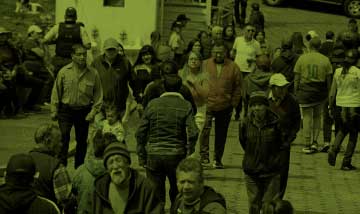Índice
- CENTRAL AMERICA: UNREST, REPRESSION GROWS AMID CORONAVIRUS CRISIS
- BRAZIL JUSTICE MINISTER RESIGNS OVER BOLSONARO’S INTERFERENCE IN INVESTIGATIONS — AND IMPEACHMENT TALK RAMPS UP
- MEXICAN CRIMINAL GROUPS SEE COVID-19 CRISIS AS OPPORTUNITY TO GAIN MORE POWER
- COVID-19 AND ECONOMIC DEVELOPMENT IN LATIN AMERICA
- .TRACKING LATIN AMERICA’S OTHER PANDEMIC: VIOLENCE AGAINST WOMEN
Understanding Latin America
This month we bring you five articles: from Central America , where the Coronavirus containment measures are provoking protests and fears of abuse of Human Rights; Brazil, where the resignation of Justice Minister Sergio Moro has caused an important shift in the country’s political scene<; from Mexico where armed criminal gangs are using the Covid-19 crisis and gaps in state power in order to increase their own social capital; and, on a regional level, an analysis of both the possibly dire economic prospects for the region, and of the increase in domestic abuse during lockdown measures with its consequent need for better data in order to tackle the scourge of domestic violence.
.
CENTRAL AMERICA: UNREST, REPRESSION GROWS AMID CORONAVIRUS CRISIS
Most Central American governments reacted quickly to the COVID-19 crisis, bringing in strict lockdown measures to limit the spread of the virus. However, as in other Latin American countries, high rates of inequality, poverty and informal work have led to resistance to the measures. People dependent on what they can sell on the streets are objecting to the measures throughout the region, but in some cases their protests have been over zealously suppressed by security forces. In Honduras tear gas was used on people asking for food, and in one case protesters reported that police had threatened to shoot them with live ammunition. Measures to relieve the problem have been taken in some countries. In El Salvador utility payments have been suspended and $300 subsidy offered to some people, while in Panama, laid off workers can receive $40 every 15 days and in Guatemala struggling families can receive about $130. But the measures are not always sufficient and distribution has been a problem. Recipients of food aid in Honduras, for example, have said that the rice, flour and beans they were given are only enough to feed a family for two days. The result has been continued protest and defiance of lockdown restrictions. Reports estimate that across Central America some 28,000 people have been detained, leading to fears of major repression and abuse of human rights.
Anna-Cat Brigida, 22ndApril, 2020
https://www.aljazeera.com/
.
BRAZIL JUSTICE MINISTER RESIGNS OVER BOLSONARO’S INTERFERENCE IN INVESTIGATIONS — AND IMPEACHMENT TALK RAMPS UP
The resignation of Brazilian justice minister, Sergio Moro, the judge mainly responsible for the prosecution of ex-President Lula da Silva, has produced shock waves in the country’s political arena. A representative of the center right anti Lula faction, Moro and his allies were a pillar of President Jair Bolsonaro’s governing coalition, even though Moro was also seen as possible competition for Bolsonaro in the next Presidential Elections. The Justice Minister resigned after Bolsonaro dismissed the director of Federal Police Mauricio Valeixo at the very time that his sons are the subjects of a number of police investigations. Carlos Bolsonaro has been linked to an operation to spread Fake news, while a money laundering scheme may link Flavio Bolsonaro with the death of Rio City Councilor Marielle Franco. The Public Prosecutor’s Office has also asked the Supreme Court to investigate the legality of a demonstration in Brasília (where the President himself spoke) which called for a military coup and the forced shutdown of Congress. The possibility of impeachment is increasing; the complication for the left being that the removal of Bolsonaro would bring Vice President and retired general Hamilton Mourão to power. Mourão is an admirer of 1964-85 Brazilian military dictatorship, and also seen as likely to continue Bolsonaro type policies. In the short term, whether Mourão assumes the Presidency or not, with the departure of Moro the military now appears to be in control.
Andrew Fishman, Cecília Olliveira., 24thApril, 2020
https://theintercept.com/2020/04/24/bolsonaro-impeachment-moro-resigns-brazil/
.
MEXICAN CRIMINAL GROUPS SEE COVID-19 CRISIS AS OPPORTUNITY TO GAIN MORE POWER
Over the last 20 years national governments in Mexico have proved incapable of controlling the drug trade and its accompanying violence, and the present government of Andres Lopez Obrador is no exception. Presently almost 200 criminal groups are operating in Mexico, and to add to the administration’s woes, the COVID-19 health crisis has offered these groups the chance to extend their influence. The fight for dominance between criminal groups has turned Mexico into one of the most violent countries in the world: 34,582 people were reported killed in 2019, while 2,585 were murdered in April 2020 alone. The country’s economy is also precarious; almost half of work is informal, with the health crisis and lockdown measures only exacerbating the problem. Criminal bands are now filling gaps left by the State, in the process building social capital by distributing food and other necessities to needy local people. As one person in Michoacán explained “It isn’t like any of them are good people. But the truth is we can’t expect much from anybody else. At least we know [the local armed group], so they are in some way the least bad solution.”
Ernst Falko, 20thApril, 2020
https://www.theguardian.com/world/2020/apr/20/mexico-criminal-groups-covid-19-crisis-opportunity-gain-power
.
COVID-19 AND ECONOMIC DEVELOPMENT IN LATIN AMERICA
According to the author of this in depth analysis, the impacts of the COVID-19 health crisis on Latin American economies will be dramatic, particularly for the poor and underemployed. The situation has been aggravated by investors withdrawing funds from the region, falling global commodity prices and a major decline in asset prices, raising serious concerns about debt sustainability. At the same time, the flexibilization of labor, suppressing wages, and a chronically weak domestic demand have resulted in an increase in household debt as people turn to credit in order to finance consumption. The overall situation, suggests the author, is extremely dangerous, and without a major rethink in economic policy could lead to: “an unprecedented decline in trade and commerce, corporations defaulting or going bankrupt … sovereign debt crises and further currency devaluations, financial crises resulting from corporate and household defaults on private debts, and a huge jump in unemployment, poverty, and inequality.” The author concludes that what is needed is international debt cancellation, together with a reversal of privatization reforms and the nationalization of commodity-extracting companies. A shift towards a state-led development model, he suggests, could “make best use of nationalized extractive revenues and newly created fiscal resources is also necessary.” In the short term “governments could help to ameliorate the liquidity and solvency problems of households by suspending mortgage and rent payments, creating unconditional cash transfer programs, and investing in social services in order to mitigate the pressures bearing on those in low-wage or informal employment without access to savings or healthcare.”
Tobias Franz, 16thApril, 2020
https://blogs.lse.ac.uk/latamcaribbean/2020/04/16/covid-19-and-economic-development-in-latin-america/#author-info
.
TRACKING LATIN AMERICA’S OTHER PANDEMIC: VIOLENCE AGAINST WOMEN
The increases in complaints about domestic violence during the lockdowns attributable to the COVID-19 health crisis have not been a surprise. Confinement for weeks on end with a possibly abusive partner whose economic and social situation has deteriorated was pointed out as a serious problem once the response to the virus began. What has been seen is in fact startling. Calls to domestic abuse hotlines in Argentina rose 40% after the government instituted a mandatory quarantine, in Mexico they rose 60% in the weeks after social distancing was instituted, while in Colombia, the increase has been over 90%. One of the problems in dealing with domestic abuse and femicides is the lack of consistent reliable data. Although it is estimated that in 2018 at least 3,529 women were victims of femicide in the region, at least 16 different criteria are being used to define the crime. According to the author, this lack of consistency is hampering efforts to implement public policies designed to effectively tackle the scourge.
Silvana Fumega, 13thApril,2020
https://www.americasquarterly.org/article/tracking-latin-americas-other-pandemic-violence-against-women/





